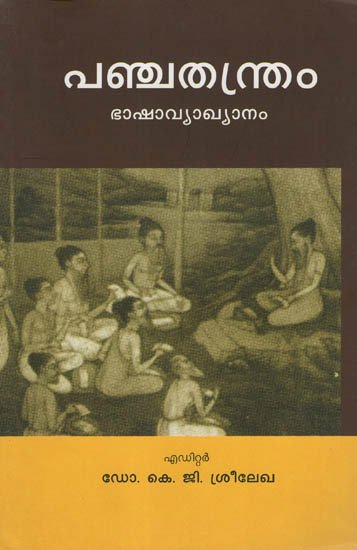Panchatantra [sanskrit]
by Dr. Naveen Kumar Jha | 2016 | 13,828 words | ISBN-13: 9788193077962
The Sanskrit edition of the Panchatantra referencing the English translation and grammatical analysis. Written by Vishnu Sharma and possibly dating as early as 1200 BCE, the Panchatantra (or Pancatantra) represents a collection of short stories teaching basic ethical values and moral conduct that was commonly practiced in ancient Indian. Alternative titles: Śrīviṣṇuśarman Pañcatantra (श्रीविष्णुशर्मन् पञ्चतन्त्र, Śrī-viṣṇuśarman pancatantra, श्री-विष्णुशर्मन्, Sri-visnusarman)
Verse 1.351
यस्यास्ति सर्वत्र गतिः स कस्मात् स्व-देश-रागेण हि याति नाशम् ।
तातस्य कूपो ऽयम् इति ब्रुवाणाः क्षार-जलं कापुरुषाः पिबन्ति ॥ ३५१ ॥
yasyāsti sarvatra gatiḥ sa kasmāt sva-deśa-rāgeṇa hi yāti nāśam |
tātasya kūpo 'yam iti bruvāṇāḥ kṣāra-jalaṃ kāpuruṣāḥ pibanti || 351 ||
The English translation of Panchatantra Verse 1.351 is contained in the book The Complete Pancatantra: Sanskrit Text with English Translation by Dr. Naveen Kumar Jha. This book is not available online so in order to read the full text and translation you should buy the book:
Buy now! English translation by Dr. Naveen Kumar Jha (2016)
Glossary of Sanskrit terms
Note: This extracts Sanskrit terms and links to English definitions from the glossary, based on an experimental segmentation of verse (1.351). Some terms could be superfluous while some might not be mentioned. Click on the word to show English definitions.
Yasya, Yah, Yat, Asti, Sarvatra, Gati, Kasmat, Kah, Kim, Sva, Svan, Desha, Raga, Yati, Nasha, Tata, Kupa, Aya, Idam, Iti, Bruvana, Kshara, Jala, Kapurusha, Pibat, Pibanti,
Analysis of Sanskrit grammar
Note: this is an experimental feature and only shows the first possible analysis of the Sanskrit text (Panchatantra Verse 1.351). If the system was successful in segmenting the sentence, you will see of which words it is made up of, generally consisting of Nouns, Pronouns, Verbs, Participles and Indeclinables. Click on the link to show all possible derivations of the word.
- Line 1: “yasyāsti sarvatra gatiḥ sa kasmāt sva-deśa-rāgeṇa hi yāti nāśam ”
- yasyā -
-
yasya (noun, masculine)[compound], [vocative single]yasya (noun, neuter)[compound], [vocative single]√yas -> yasya (absolutive)[absolutive from √yas]yasyā (noun, feminine)[nominative single]ya (noun, masculine)[genitive single]yaḥ (pronoun, masculine)[genitive single]yat (pronoun, neuter)[genitive single]√yas (verb class 4)[imperative active second single]
- asti -
-
asti (noun, feminine)[compound], [adverb]astī (noun, masculine)[adverb], [vocative single]astī (noun, feminine)[compound], [adverb], [vocative single]astī (noun, neuter)[compound], [adverb], [nominative single], [vocative single], [accusative single]√as (verb class 2)[present active third single]
- sarvatra -
-
sarvatra (indeclinable)[indeclinable]
- gatiḥ -
-
gati (noun, feminine)[nominative single]gati (noun, masculine)[nominative single]
- sa -
-
sa (noun, neuter)[compound], [vocative single]sa (noun, masculine)[nominative single]
- kasmāt -
-
kasmāt (indeclinable)[indeclinable]ka (noun, masculine)[ablative single]kaḥ (pronoun, masculine)[ablative single]kim (pronoun, neuter)[ablative single]
- sva -
-
sva (noun, neuter)[compound], [vocative single]svan (noun, masculine)[compound]svan (noun, neuter)[compound], [adverb], [nominative single], [accusative single]sva (noun, masculine)[vocative single]
- deśa -
-
deśa (noun, masculine)[compound], [vocative single]
- rāgeṇa -
-
rāga (noun, masculine)[instrumental single]
- hi -
-
hi (indeclinable particle)[indeclinable particle]
- yāti -
-
yāti (noun, masculine)[compound], [adverb]yāti (noun, feminine)[compound], [adverb]yāti (noun, neuter)[compound], [adverb], [nominative single], [vocative single], [accusative single]yāt (noun, masculine)[locative single]yāt (noun, neuter)[locative single]√yā (verb class 2)[present active third single]
- nāśam -
-
nāśa (noun, masculine)[adverb], [accusative single]√naś -> nāśam (absolutive)[absolutive from √naś]√naś -> nāśam (absolutive)[absolutive from √naś]
- Line 2: “tātasya kūpo 'yam iti bruvāṇāḥ kṣāra-jalaṃ kāpuruṣāḥ pibanti ”
- tātasya -
-
tāta (noun, masculine)[genitive single]
- kūpo' -
-
kūpa (noun, masculine)[nominative single]
- ayam -
-
aya (noun, masculine)[adverb], [accusative single]idam (pronoun, masculine)[nominative single]
- iti -
-
iti (indeclinable particle)[indeclinable particle]iti (noun, feminine)[compound], [adverb]
- bruvāṇāḥ -
-
bruvāṇa (noun, masculine)[nominative plural], [vocative plural]bruvāṇā (noun, feminine)[nominative plural], [vocative plural], [accusative plural]
- kṣāra -
-
kṣāra (noun, masculine)[compound], [vocative single]kṣāra (noun, neuter)[compound], [vocative single]
- jalam -
-
jala (noun, masculine)[adverb], [accusative single]jala (noun, neuter)[adverb], [nominative single], [accusative single]jalā (noun, feminine)[adverb]
- kāpuruṣāḥ -
-
kāpuruṣa (noun, masculine)[nominative plural], [vocative plural]kāpuruṣā (noun, feminine)[nominative plural], [vocative plural], [accusative plural]
- pibanti -
-
pibantī (noun, masculine)[adverb]pibantī (noun, feminine)[compound], [adverb], [vocative single]pibantī (noun, neuter)[compound], [adverb], [nominative single], [vocative single], [accusative single]√pā -> pibat (participle, neuter)[nominative plural from √pā class 1 verb], [vocative plural from √pā class 1 verb], [accusative plural from √pā class 1 verb]√pā -> pibantī (participle, feminine)[vocative single from √pā class 1 verb]pibat (noun, neuter)[nominative plural], [vocative plural], [accusative plural]√pā (verb class 1)[present active third plural]
Other editions:
Also see the following editions of the Sanskrit text or (alternative) English translations of the Panchatantra Verse 1.351
Pancatantra of Visnusarman
by M. R. Kale (2015)
Panchatantra in Simple Sanskrit
by Dr. Vishwas (2016)
Panchatantram (Telugu)
by Tadanki Venkata Lakshmi Narasimha Rao (2020)
Published by J. P. Publications, Vijayawada; Throughout black & white Illustrations; 9788192053851.
Buy now!Preview of verse 1.351 in Telugu sript:
యస్యాస్తి సర్వత్ర గతిః స కస్మాత్ స్వ-దేశ-రాగేణ హి యాతి నాశమ్ ।
తాతస్య కూపో ఽయమ్ ఇతి బ్రువాణాః క్షార-జలం కాపురుషాః పిబన్తి ॥ ౩౫౧ ॥
Panchatantram Bhashavyakhyanam (Malayalam)
by Dr. K.G. Sreelekha (2010)
Published by the University of Kerala.
Buy now!Preview of verse 1.351 in Malayalam sript:
യസ്യാസ്തി സര്വത്ര ഗതിഃ സ കസ്മാത് സ്വ-ദേശ-രാഗേണ ഹി യാതി നാശമ് ।
താതസ്യ കൂപോ ഽയമ് ഇതി ബ്രുവാണാഃ ക്ഷാര-ജലം കാപുരുഷാഃ പിബന്തി ॥ ൩൫൧ ॥
The Panchatantra Stories (Tamil)
by P. S. Aacharya (2017)
Published by Narmadha Pathippagam, Chennai.
Buy now!
Panchatantrer Galpa (Bengali)
by Children's Book Trust (2014)
Throughout color Illustration; 9788170112730
Buy now!Preview of verse 1.351 in Bengali sript:
যস্যাস্তি সর্বত্র গতিঃ স কস্মাত্ স্ব-দেশ-রাগেণ হি যাতি নাশম্ ।
তাতস্য কূপো ঽযম্ ইতি ব্রুবাণাঃ ক্ষার-জলং কাপুরুষাঃ পিবন্তি ॥ ৩৫১ ॥
Panchatantra in Gujarati (Comic)
by Anant Pai (2013)
[શિયાળા અને રણશિંગ પંચતંત્ર] Published by Amar Chitra Katha; Throughout Color Illustrations; 9789350853115
Buy now!Preview of verse 1.351 in Gujarati sript:
યસ્યાસ્તિ સર્વત્ર ગતિઃ સ કસ્માત્ સ્વ-દેશ-રાગેણ હિ યાતિ નાશમ્ ।
તાતસ્ય કૂપો ઽયમ્ ઇતિ બ્રુવાણાઃ ક્ષાર-જલં કાપુરુષાઃ પિબન્તિ ॥ ૩૫૧ ॥
![Panchatantra [sanskrit] - book cover](/uploads/a/Pancatantra.jpg)






